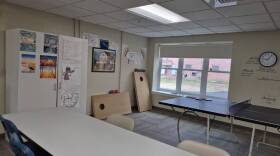This Monday and Tuesday marks New Hampshire’s first heat wave of the season, with heat indexes reaching over 100 degrees.
The National Oceanic and Atmospheric Administration has placed most of the state under a major heat risk alert, meaning temperatures can be dangerous for those without effective cooling and/or adequate hydration.
In Concord, the Coalition to End Homelessness is trying to support those currently unhoused, or at risk of being unhoused, through extreme weather.
This week, the Coalition will expand its Resource Center’s operating hours.
On Tuesday, Wednesday and Thursday the Center will be open from 9 to 11:30 a.m., and from 1 to 4 p.m., offering AC, water, light snacks and other services.
Read more from NHPR about how to stay safe during extreme heat.
According to Kait Gallagher, director of development and communications for the coalition, they had hoped to also expand the center’s operating hours on Monday, the first day of the heat wave, but did not have enough available staff to do so.
For Gallagher, more frequent and extreme weather patterns is a growing concern, especially because Concord lacks reliable cooling and warming centers where they could direct people in need, she said.
“The coalition, in partnership with other organizations in town, we're trying to fill that need as best we can within the limits of our resources,” Gallagher said.
On average, about 45 individuals visit the Resource Center on a typical day, but that number usually increases during extreme weather, Gallagher said.
In rural areas of the state, hospitals have also faced added challenges during heat waves.
Julie Bolton, systems infection preventionist for North Country Healthcare and an emergency room nurse, said a major challenge for hospitals in the region is supporting tourists who come from other areas trying to escape the heat, especially when they rely on primary care from out of state.
“We have a tight knit, little community, and we do okay, as far as getting our patients to the ER and getting our patients to their primary,” Bolton explained. “When somebody comes up and they're here for a month and a half, two months, and they're having a difficult time getting to a primary care because their normal primary care is down country … that's a real struggle.”
Last year, there was about a 150-patient increase across three emergency rooms in the North Country in June and July compared to other months of the year.
Bolton added that summer is particularly risky, since many of their regular patients are part of groups more vulnerable to extreme heat, such as older people and outdoor workers.
“We do have people that work outside. We have the farmers, we have the farmers that are also aged and have comorbidities as well,” Bolton said.
Hospitals try to prepare in advance, hiring additional summertime staff, checking on backup generators and IV supplies, and educating community members on how to stay safe during heat waves.
“We do meet the challenge, but it is sometimes a challenge,” Bolton said.
For many doctors, those preparations still feel new.
“I can tell you, 35 years ago we didn't have ice baths in the ER, but they will probably be used in the next couple of days,” said Robert Dewey, retired cardiologist and board member at NH Healthy Climate.
“The extreme heat days are really increasing really rapidly in the last five, ten years,” Dewey added. New Hampshire has already experienced above 1.5 degrees Celsius of warming, faster than much of the country, as the climate changes.
“It's something that we need to start taking a little more seriously than I think we do,” Dewey said.
At Cheshire Medical Center in Keene, responders mostly see cases of dehydration and respiratory issues during heat waves, said EMS and emergency manager Ryan Hornblower.
While they anticipate heat related cases during the summer, their preparation happens year round.
“We do a lot of planning throughout the year to make sure that our facility is able to run in various conditions … so that there isn't the need to do a lot of extra planning,” Hornblower said.
Bolton also says that providers are ready to take on patients during heat waves.
“The providers are definitely ready to go. They're going to take care of all we throw at them,” she said.








